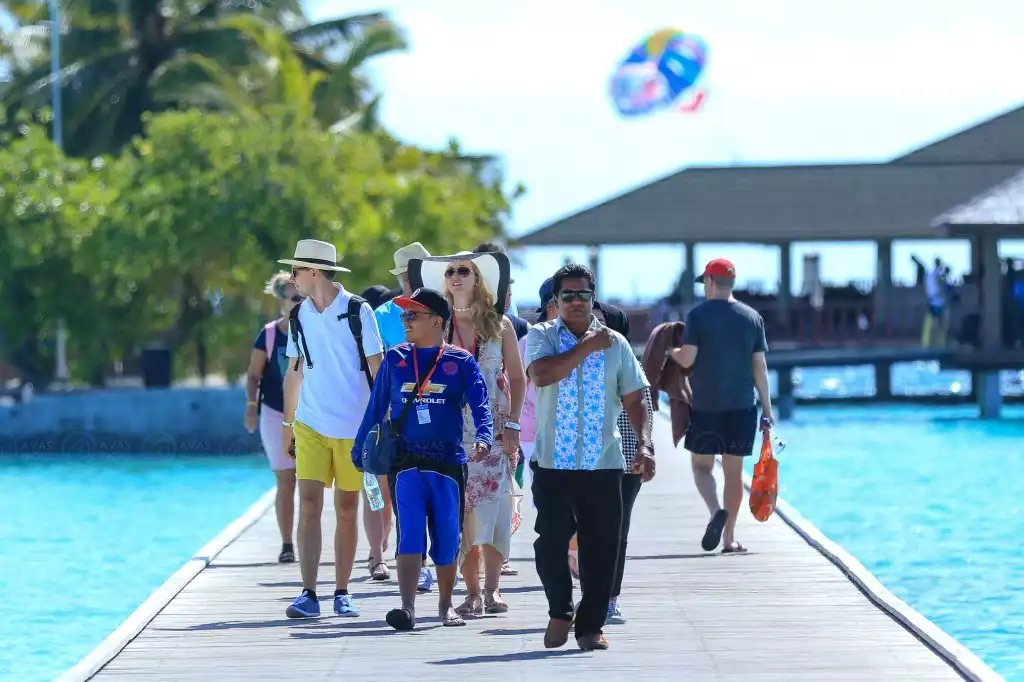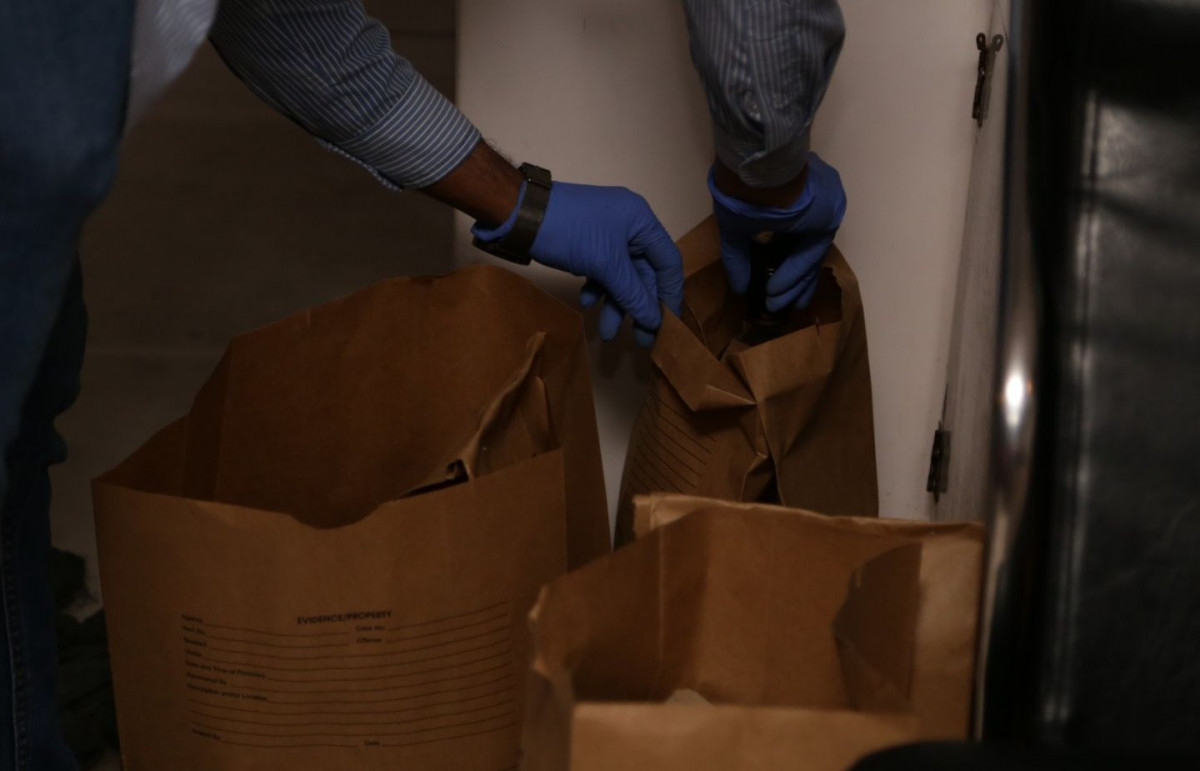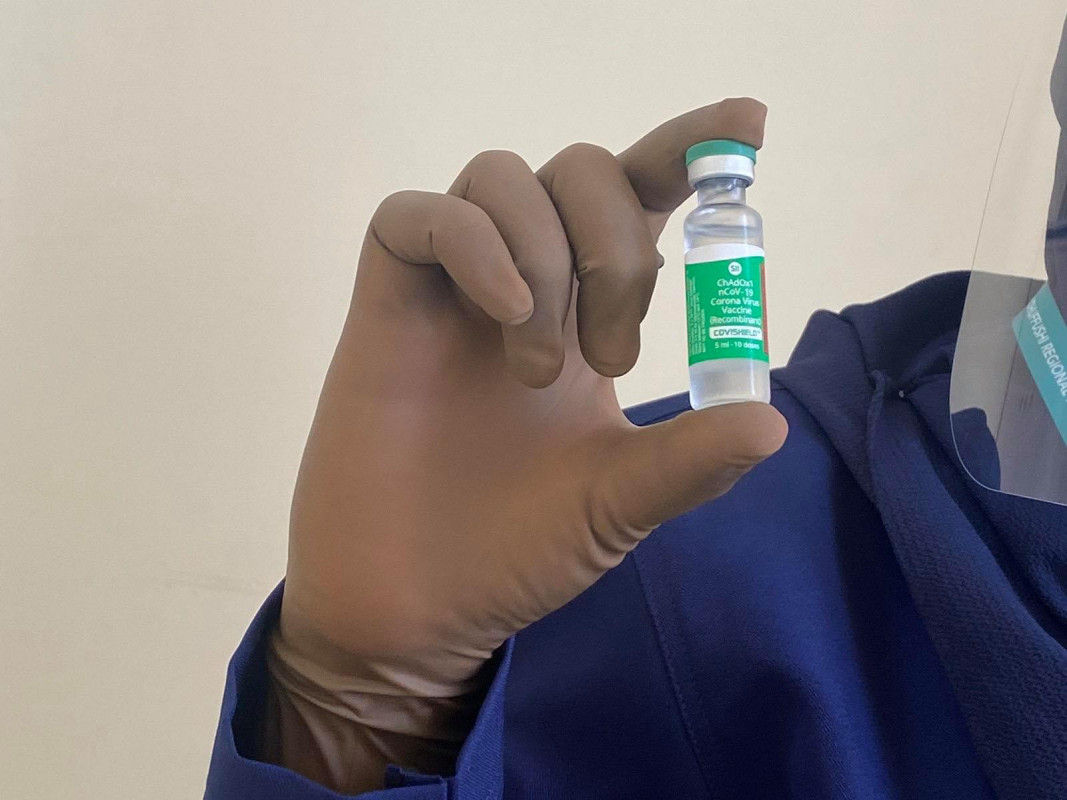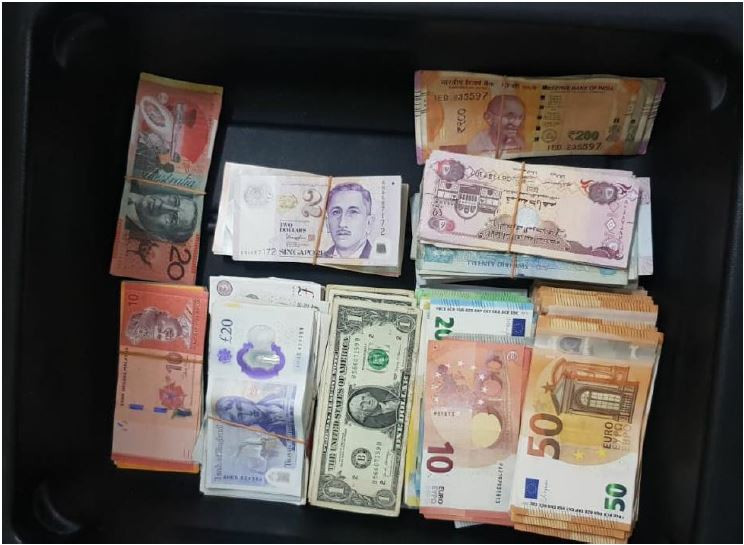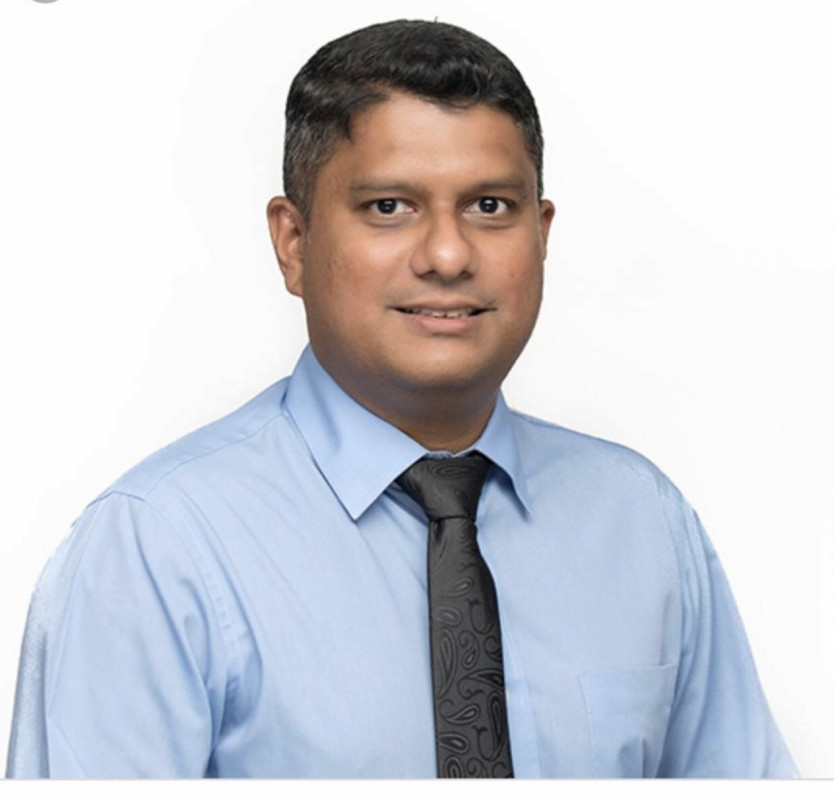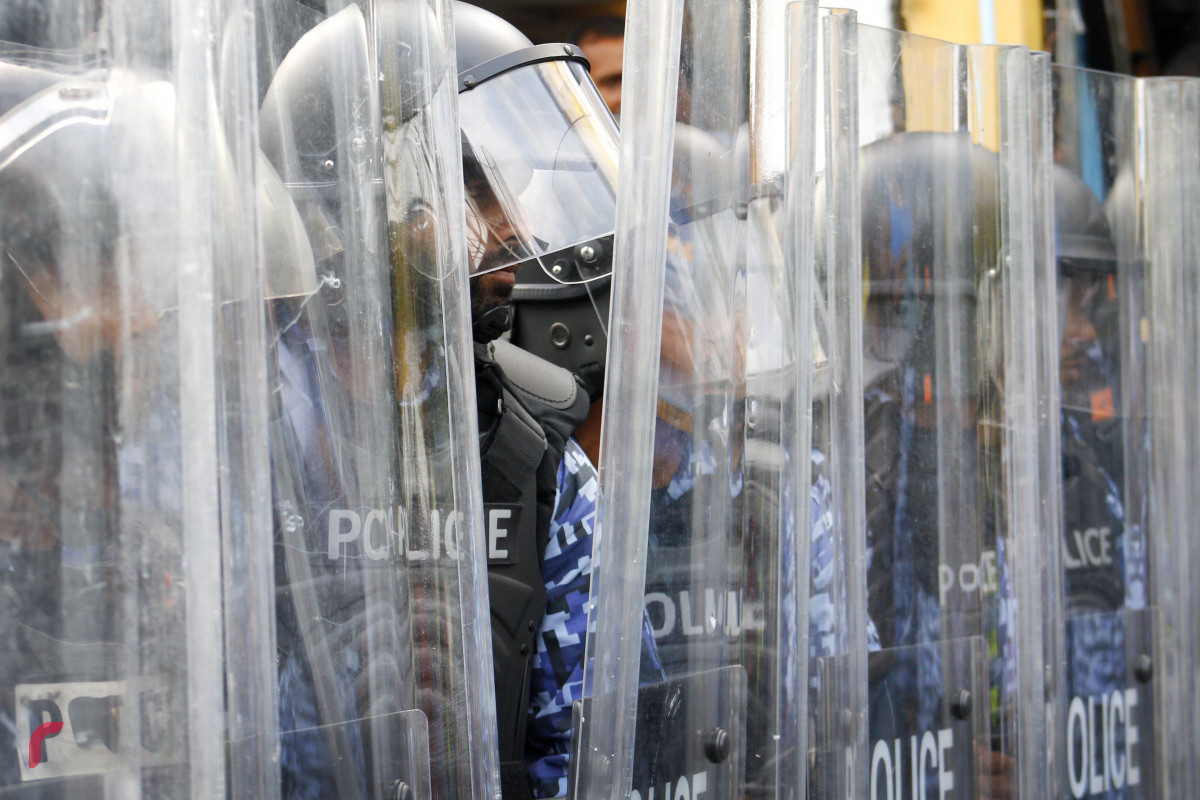Hundreds of youth-protesters raise voices over violence against women and children
On Thursday, Maldives Police Service arrested a 24-year-old locla man for sexually assaulting a three-year-old toddler
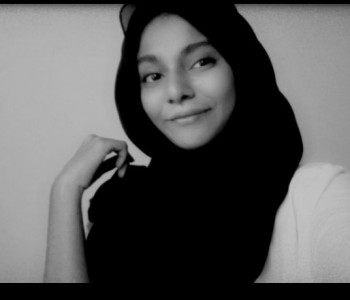
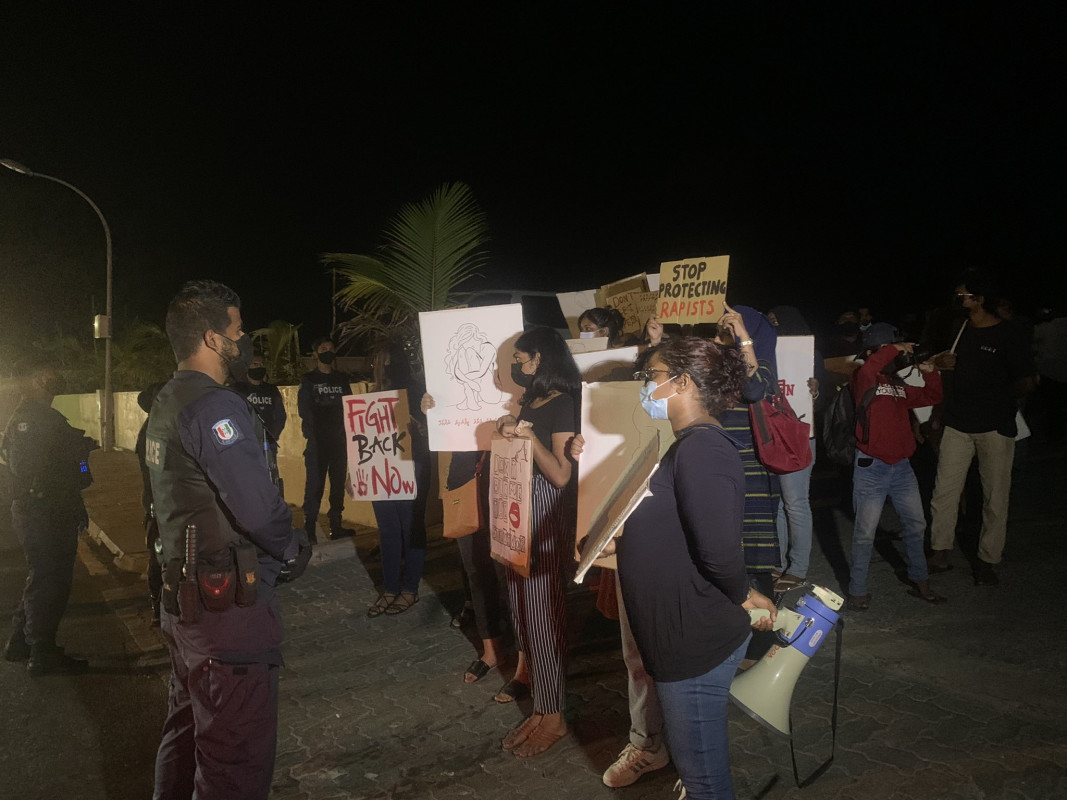
Protestors gathered at the Usfasgandu area in Male' on Saturday to protest violence against women and children
Protestors gathered at the Usfasgandu area in Male' City on Saturday night, voicing concerns over the brutality of violence against women and children being reported in recent days.
Maldives Police Serive (MPS) had been active at the scene of the protest at Usfasgandu, and had reportedly asked protestors to not take their demonstration to the inner-city. A number of young people were seen with signs in the area, engaging in heated arguments with law enforcement officers. Protestors expressed outrage over the government's inability to address the issue of violence against women in children in the Maldives.
The issue has been critical of late, with a number of young people taking to social media to share experiences of having been abused or violated in some form. The increase in instances of harassment, sexual violence, abuse and neglect reported for women and children in the Maldives, both unofficially and not, represent a very grim picture. Women and children are especially vulnerable to domestic violence, and in a country like Maldives, the pandemic has worsened pre-existing flaws within society that make women and children more likely to be exploited by abusers. In the capital city, daily headlines depict a barbaric disregard for humanity, which is mirrored across atolls when it comes to protecting the rights of women and children in Maldives.
This is not the first time protests have exploded across the Maldives' capital over the prevalence of domestic violence, with an uptick in the number of cases of sexual violence and child abuse being reported across the island nation in recent days. Simmering issues inside communities in the Maldives have worsened in a way that can be attributed to the major lifestyle changes people experienced due to Covid-19. As the infection continues to spread across the world, devastating huge countries like America, India and Brazil, it introduces a number of new tensions, physical and psychological risks, isolation, economic uncertainty and among vulnerable communities worldwide.
The notion that domestic violence may increase amid the pandemic, when families have been forced to remain largely at home in lockdown, is not new. In 2020, UNDP reported that millions of women across the world were more likely to be subjected to abuse amid pandemic conditions. Even now, despite historic advancements in education and technology, it is estimated that less than 40 percent of all women who experience violence report it.
However, the shadow effects of the global Covid-19 pandemic have seen the number of instances of violence reported against women skyrocket across world countries. UNDP and UN Women have since launched the Covid-19 Global Gender Response Tracker to introduce measures that will address women's rights amid the pandemic. Just as the issue has become a phenomena worth studying abroad, it has also created a tangible stress among vulnerable groups in Maldivian communities. From a global scale to the local stage, the rights of women and children are deeply intertwined with preventing instances of domestic violence, which have become underlined further by social and economic conditions related to the pandemic.
In the UNFPA's 'Gender-based violence during Covid-19 pandemic in Maldives: An analysis of reported cases', the Maldives Study on Women's Health and Life Experiences is cited to show that even in Maldives, 1 in 3 women aged between 15 and 49 have experienced physical or sexual violence, or both, during their lifetime. The number of gender-based violence cases reported to the Ministry of Gender, Family and Social Services and the Family Protection Agency illustrated an increase in cases reported from Male' City in 2020 after Male' City was locked down. The number of cases being detected had increased in September that year when lockdown was eased.
Despite positive steps such as strengthening of legislation to protect women and children, and awareness programmes that nurture community action against domestic violence, the lived reality for Maldivian women has worsened over the years. A Demographic Health Survey conducted by the Ministry of Health in 2016 shows that 1 in every 4 partnered-women have faced physical and/or sexual violence from an intimate partner in their lifetime, which is an increase from the previous statistic of 1 in 7 reported in 2007. With civil society taking the brunt of the blows, it has become apparent that increasing religious extremism are just some of the emerging issues that have cancelled out gains made in ensuring the rights of women and children across the country. In order to achieve this, rights groups that have gone on to assess the government’s adherence to its obligations under international conventions such as CEDAW, among other pledges to protect women and children, have been targeted by extremists empowered by gang culture and political influence.
In the Maldives, headlines over the past few years have featured gang rapes, sexual assault of foreigners, grooming, child pornography, child rape, varying degrees of domestic violence, harassment in the workplace and abuse of children. They have endured presidential pardon's for sex offenders, and ministers who were allowed to leave the country to avoid prosecution for attempted rape. They have included stories that describe children getting roofied by educators and toddlers being violated by male relatives. The recent outpouring of rage being expressed by youth at Usfasgandu exhibits the culmination of a series of terrifying realizations; that despite all the progress of recent years, the cycles of violence that exploited women and children in Maldives remained largely unchanged. Over the past two months alone, Police have been investigating an instance of gang rape outside the Maldives' capital, and one case of sexual abuse of a three-year-old. A number of citizens were active within online discussions and organizing protests, furious with the government's progress on their pledges to protect women and children in Maldives.
While Saturday's protest had seen participants engage in arguments with police officers over women's rights issues, it can be certainly taken as a sign that society is more ready now for such conversations. The government has had a poor track record of dealing with cases involving violence against women and children, with the first Minister of Gender appointed under the Solih administration forced to resign early on due to glaring failures. The case of former Minister of Tourism Ali Waheed also stands as a permanent stain; Ali Waheed, who has previously sought political asylum abroad, was allowed to leave the Maldives while on trial for seven counts of sexual violence against his employees. In the past, the Solih administration's apparently strong stance against abuse of women and children in the Maldives had left much to be desired from an implementation and policy-based perspective. However, it remains to be seen how the government will react to the demands made heard by protestors on Saturday, to hold perpetrators accountable and to fund the safety of women and children across the Maldives.
